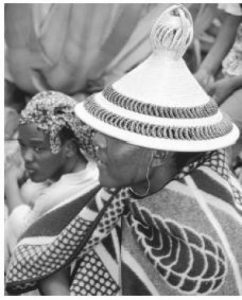
This is a guest post by Homestead: Theatre of Words.
In 1871, Lesotho (Basutoland) was annexed to the Cape Colony of South Africa, but despite the energy of Colonel Griffith, the Government Agent, power remained in the hands of the chiefs. When the Kimberley diamond mines opened up, many Basotho found work in the diggings and used their earnings to buy guns and ammunition. The Basotho had always been well armed with modern weapons (which in part is the reason for their success in combat with the Boers and the English), and although it caused some concern for the Government to have a well-armed rebellious nation under their jurisdiction there was little real threat of an insurrection. In 1878, however, J. G. Sprigg, the then Prime Minister of the Cape Colony, ordered the Basotho to disarm. This was the beginning of the war – the Gun War – that was to see the eventual independence of Lesotho from outside rule.
Maama (1848 – 1924) was the second son of the paramount chief’s fourth house, second only in accession to Lerotholi (who ruled for many years), and was a figure of considerable importance. He was an important general during the Gun War, and is one of the great modern heroes of Lesotho. His Lithoko are still admired and still performed today.
During the Gun War, Maama shot and killed a Boer soldier, Erasmus, and this is considered one of his most noble and dashing exploits. The following Lithoko draws upon this event. Maama is credited with the composition of his own Lithoko, and it was performed in an arrested form well into the 20thC. The vultures throughout the poem refer to the Vulture regiment, of which Maama was the leader. (trans. Damane & Sanders)
Maama, the favourite of the family of Senate,
The favourite in amid the rocks,
In amid the rocks, at the home of Letsabisa,
Behind the hut of Letsabisa’s mother!
When I was fighting, as a man of Lerotholi,
I fought like a bull of mixed breed:
As I fought I raised clouds of dust.
I’ve stabbed the white bull from Sprigg’s.
Stab the European, that he tires, Senate’s man:
Let me kill him, I’ll never be afraid of him.
I see him, the Chief,
Lerotholi RaLetsabisa’s watching to see
A wild man with a stallion!
You saw me, young men, when we left the plain,
Being fired at with a smoking canon.
They had groundless fears, did the children of Mojela,
Mojela and Sariele fled!
When I reached them I spurred them on,
I gave them the war-song, the chant of men,
The mountains of home gave the alarm for me:
There were echoes at the high mountain of Likhoele.
The bitter herb, Mokhachane’s returner,
The chief who returns when men are dying,
When the bullets are splitting men’s heads,
When the swords are striking men’s necks,
When the grenades are bursting, and the fires blazing,
Blazing, and showing their darting flames,
When many are saying: “It’s the last day!”
There returned the Crocodile of the son of Mokhachane,
The little Crocodile of the family of Seeiso.
Put back your stick, Mohato’s son, and take out your gun.
I struck a man from his horse with a gun,
The white-horsed European died indeed!
The grey-horsed European fell among the staves with the ostrich plumes
on the shields,
He fell among the Young Vulture’s spearshafts.
You’re always saying that you’re brave, you Vultures, Young Vultures of
Maama,
In courage you’re surpassed by the great one:
The first to fall was the Vulture’s man,
The Young Vulture’s man has fallen first.
In surpassing ‘Matsoana you’ve excelled,
You’ve surpassed Sethobane and RaPontso!
Good fortune has come from the ancestors,
It’s come from Peete and Mokhachane,
It’s arisen from Letsie and Moshoeshoe.
My men have told me in person
That when I was born Letsie rejoiced:
RaLerotholi, it is said, was enraptured:
From these wild beasts he took the heads,
He took the skin of the lion and the leopard, and he said:
“Today there is born a warrior!”
And this indeed was the truth:
The bull stabs some in the flanks,
Others it stabs in the ribs.
I’ve killed the florid redskin, the wretched little white man;
I threw him to the ground.
The wailing of that man reached far away,
In the end it could be heard at the Cape and the Bay,
And Smithfield town heard too!
I, the young cub, have been sired by the strong,
And so I’m a mighty warrior:
I was sired by bulls that were strong,
I’ve been sired by Libe, the child of Matlole,
And Mohato, Thesele’s boy.
RaMatiea, go and report,
You who like taking news,
Go and inform Letsie,
That he may make known to my mother’s family that they may know,
That he may make known to the folk from Milibeli’s;
I, their dog, bite when I’m sent to attack,
I bit Sprigg’s man.
The whirlwind of Senate, Maama,
Thundered, it took the young man from his horse,
It deprived him of his bridle and bit,
It devoured him to the ground with the insects.
A white man left home and was swearing,
Thumping and beating on his chest;
One day he took off his hat,
He stamped on it with his boots,
Indeed with his feet he trampled it:
“Bring the guns here, you Kaffirs!”
Ours we refused to give,
Our spears are our dangerous weapons of old.
Even when RaTlali left them they were fighting;
They continued to cut off men’s heads:
They’ve devoured Nkopane and Mohlomi.
Child of Mahoto’s wife, Maama,
Warthog of the family of Seeiso, elephant of the Searchers,
Maama, strike, that the Young Vultures may strike,
That Sethobane and RaPontso may strike,
That the Dog-eaters may stab them with spears!
Letsie, give us cattle, we’re yours:
We’re dogs, bulldogs of yours:
You’ll strike with us at the nations!